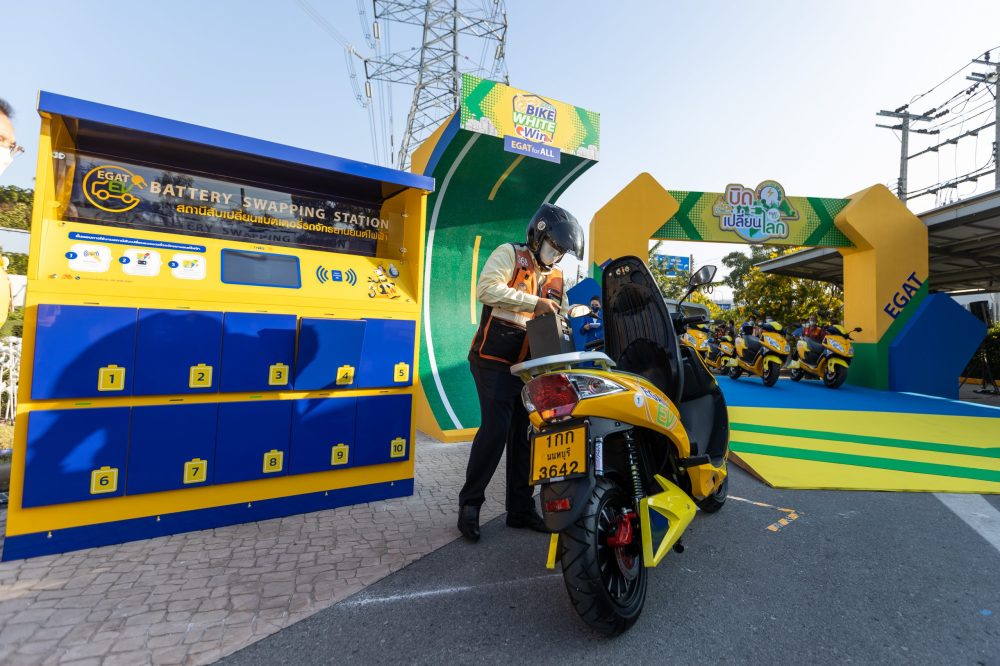
The Thai government is starting a new trial in Bangkok that will see electric scooters replace their gas counterparts for motorcycle taxis in the city.
The trial run could have big implications not just for Bangkok, but for scooter and motorcycle-laden cities across much of Asia.
If you’ve ever visited Thailand, you’ll surely have seen two of their most popular forms of public transportation that we don’t offer here in the West: rickshaws (tuk-tuks) and motorcycle taxis.
While a single person needing to catch a ride in Los Angeles is likely to call an Uber, in Bangkok it is much faster and easier to hail a motorcycle taxi. Simply hop on the back and be whisked away to your destination, traffic be damned.
But between the motorcycle taxis and private motorcycles and scooters in Bangkok and other Asian cities, the noise can often be unbearable. Then there are the emissions to consider.
That’s why the Electricity Generating Authority of Thailand (EGAT) is running a new trial with 51 electric scooters for use by motorcycle taxi operators.
The electric scooters will be deployed in the Bang Kruai district of Bangkok, where three battery swap stations are set up to facilitate their continuous use.
The scooters include 3 kW (4 hp) motors and have a top speed of around 80 km/h (50 mph). They are able to achieve a range per charge of approximately 100 km (60 miles).
When the battery runs low, the operators will stop by one of the three battery swap stations to replace the depleted battery with a freshly charged one.

Most of the West remains fascinated with the prospect of electric cars, but electric motorcycles and scooters have much bigger impacts in Asia where two-wheelers are often the dominant form of transportation.
They are much more affordable than cars (these electric scooters in Bangkok cost around 84,000 Thai Baht or USD $2,500), and they don’t rely on a distributed charging network.
Removable batteries allow riders to carry the battery indoors for charging at home overnight, unlike electric cars that require access to an electric vehicle charging station or wall outlet. For anyone without a garage, finding a streetside wall outlet can be an issue.
Many families across Asia commute purely by two-wheeled vehicles instead of cars, leading to seas of scooters and motorcycles filling city streets.
The associated noise and emissions have become a constant plague, but one that could be solved overnight by swapping to electric two-wheelers.

Companies like Gogoro are working hard on targeting this vast market. The Taiwan-based electric scooter and swappable battery manufacturer announced earlier this year that it was entering the Indian market and partnering with Hero Motorcorp, the world’s largest motorcycle builder.
Also targeting the Indian market is local manufacturer Ola Electric, which debuted an affordable and high-speed electric scooter for its domestic market that starts at around USD $1,050.
While Ola is purely focused on the Indian market for the time being, Gogoro announced that it would enter the Chinese market by partnering with two-wheeler leaders Yadea and DCJ, then followed up with an announcement of a partnership with Gojek that would see expansion into the large Indonesian market.
The Asian market remains a largely untapped opportunity for a massive shift away from gas-powered vehicles, but recent moves like these show that the writing may be on the wall for ICE motorbikes.
Subscribe to Electrek on YouTube for exclusive videos and subscribe to the podcast.
Author: Micah Toll
Source: Electrek



